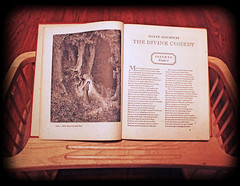Learning how to be an ethical being and true to your raw soul is perhaps one of the most difficult tasks in life. Growing into ourselves, learning who we are, and admitting to our shortcomings takes courage. In fact, it may take a lifetime to figure ourselves out. Can we be alone with ourselves at the end of the day and enjoy the company we keep even in the barest of moments? Are we honestly good people?
After reading Dante Alighieri’s The Divine Comedy through an ethical lens with Dr. Sherry Roush in her Italian course, I began to ask myself these moral questions. One cannot help but evaluate themselves while reading The Divine Comedy.
The reader follows all of Dante’s ethical dilemmas and learns moral lessons as Dante takes the pilgrimage through the underworld and beyond. Along the way, Dante the pilgrim learns of the roots of sin, righteous zeal, and the suffrage involved in the purging of sin to reach one’s ultimate happiness/goal, among many other things.
Dante’s arduous odyssey indirectly demands the reader to re-evaluate their own conscience and face their fears that are often horribly uncomfortable. However, it is out of this discomfort that we have the most potential for growth. The pilgrim is subjected to horrid discomfort in order to differentiate good from evil. Sometimes we must see the ugly in order to learn how to be good.
Perhaps one of the lines from the Comedy that spoke to me most was from Canto XXII when the soul of St. Benedict says to Dante, “The flesh of mortals is so weak: on earth a good beginning does not last as long as the oak’s springing to the acorn’s birth ” (ln. 85-87, pg. 230, Musa).
We as mortals are indeed weak, but we can work to be good, because we have the free will to make that choice. We only hope that we can have the courage to choose good, and seek the path of righteousness in our own life and take up our challenges just as Dante is called to do in the comedy.
The aforementioned message, among many other moral messages, jumped out at me upon completing The Divine Comedy. I felt so inspired. I knew I had to share this with others, and make this brilliant text, with its valuable lessons, more accessible to non-literature and Italian students. Hence, the birth of my Capstone project for the Italian department.
For my Capstone project I have decided to share Dante’s epic tale the best way I know how to share something special to me, and that is through the medium of dance. Specifically, I am currently organizing a dance production inspired by Dante Alighieri’s The Divine Comedy.
In addition to studying Italian at PSU, I am also a dance major through integrative arts. At the end of the last spring semester I held auditions for my Capstone project. I currently have twelve dancers who are now educated on the comedy thanks to Dr. Roush, who came in and guest lectured to my cast on the comedy.
I am truly grateful for Dr. Roush and the College of the Liberal Arts. Thanks to the generosity of the Italian department and the College of the Liberal Arts, I have been able to buy equipment this past summer and build set pieces for my Capstone production.
I am very, very excited to have the opportunity to combine my passions at Penn State and I hope you can make it out to the show, which is entitled, Lost in the World, the Journey of Bea! The show will take place this December, 2011, and the proceeds of the show will benefit Penn State Project Haiti. Look for posts to come with more details on show times and venue!



